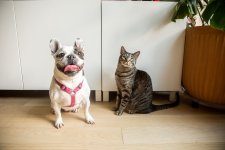
Cats and dogs are two of the most popular choices for pets, but when it comes to deciding between them, many people lean towards cats. Cats have their unique charm and qualities that make them a great companion for many individuals. In this article, we will explore why cats are considered better than dogs based on their personality, ease of care, cleanliness, suitability for apartment living, exercise needs, and affectionate nature.
Personality and Independence
Cats are Independent Creatures
One of the reasons why cats are preferred by some individuals is their independent nature. Cats are known for their self-reliance and ability to entertain themselves. They don't require constant attention or companionship, making them a suitable choice for people with busy lifestyles. Cats can spend hours playing with toys or exploring their surroundings without relying on human interaction.
Dogs Rely on Human Companionship
On the other hand, dogs thrive on human companionship and are more social animals. They seek attention, love, and constant interaction with their owners. Dogs are known for their loyalty and are often referred to as "man's best friend." While this trait is admirable, it can also be demanding, especially for individuals who have limited time or prefer a more independent pet.
Ease of Care
Cats are Low-Maintenance Pets
When it comes to ease of care, cats have the upper hand. Cats are generally independent when it comes to grooming and hygiene. They are meticulous groomers, constantly cleaning themselves and keeping their fur tidy. Additionally, cats are known to use litter boxes, which significantly reduces the need for frequent outdoor walks or potty training.
Dogs Require More Attention and Care
Dogs, on the other hand, require more attention and care. They need to be bathed regularly, their fur needs grooming, and they require daily exercise and outdoor walks. Dogs also need to be trained to relieve themselves outside, which can be time-consuming and challenging for some pet owners.
Cleanliness and Odor
Cats are Cleaner Animals
Cats are inherently clean animals. They are known for their meticulous grooming habits, which help keep their fur clean and free from dirt and debris. Cats also bury their waste in litter boxes, reducing the odor and mess associated with their bodily functions.
Dogs Tend to Have a Stronger Odor
Dogs, on the other hand, may have a stronger odor compared to cats. Their fur can trap dirt and odors, requiring more frequent baths and grooming. Additionally, dogs tend to leave their waste in the open, necessitating immediate cleanup to maintain cleanliness and prevent unpleasant smells.
Apartment Living
Cats are Well-Suited for Apartments
Cats are often preferred by individuals living in apartments or small living spaces. Their independent nature allows them to adapt well to confined environments. They are generally content indoors, as long as they have enough toys and a comfortable spot to relax. Cats also tend to be quieter, which is beneficial for apartment dwellers who want to avoid noise disturbances.
Dogs May Require More Space
Dogs, particularly larger breeds, may require more space to roam and play. They thrive in houses with yards or access to open spaces where they can run and exercise freely. While smaller dogs can adapt to apartment living with proper exercise, the lack of outdoor space can be a challenge for some dog owners.
Exercise Needs
Cats are More Independent in Their Exercise
Cats are known for their agility and ability to exercise on their own terms. They are natural climbers and enjoy exploring their surroundings. Providing vertical spaces, scratching posts, and interactive toys can satisfy their exercise needs without much human intervention.
Dogs Need Regular Physical Activity
Dogs have higher exercise requirements compared to cats. They need regular walks, playtime, and interactive activities to expend their energy. Engaging in physical activities with dogs is not only beneficial for their health but also strengthens the bond between the dog and its owner.
Affection and Bonding
Cats Show Affection on Their Own Terms
Cats have a reputation for being more selective when it comes to displaying affection. They appreciate personal space and enjoy being petted or cuddled on their terms. Cats build strong bonds with their owners but maintain their independence, providing a unique balance between companionship and personal freedom.
H2: Dogs are Known for Their Loyalty and Affection
Dogs are famously loyal and affectionate companions. They thrive on human interaction and seek constant reassurance and love from their owners. Dogs are always eager to please and form deep emotional connections with their human companions, making them ideal for individuals seeking unwavering companionship.
Conclusion
In the debate of whether cats or dogs are better, it ultimately comes down to personal preference and lifestyle. Cats offer independent companionship, low maintenance, cleanliness, and adaptability to apartment living. On the other hand, dogs bring loyalty, affection, and a higher level of social interaction. Choosing between a cat and a dog depends on individual needs, available time, and living circumstances.
FAQs
- Q: Can cats and dogs coexist peacefully in the same household? A: Yes, with proper introduction and socialization, cats and dogs can live together harmoniously.
- Q: Do cats require less attention than dogs? A: Yes, cats are generally more independent and require less constant attention compared to dogs.
- Q: Are dogs easier to train than cats? A: Dogs tend to be more trainable due to their social nature and eagerness to please their owners.
- Q: Are cats or dogs better for people with allergies? A: Cats may trigger more allergies in sensitive individuals, but hypoallergenic dog breeds are available for those with allergies.
- Q: Can cats provide emotional support like dogs? A: Cats can provide emotional support and companionship, but dogs are more commonly recognized as emotional support animals.
